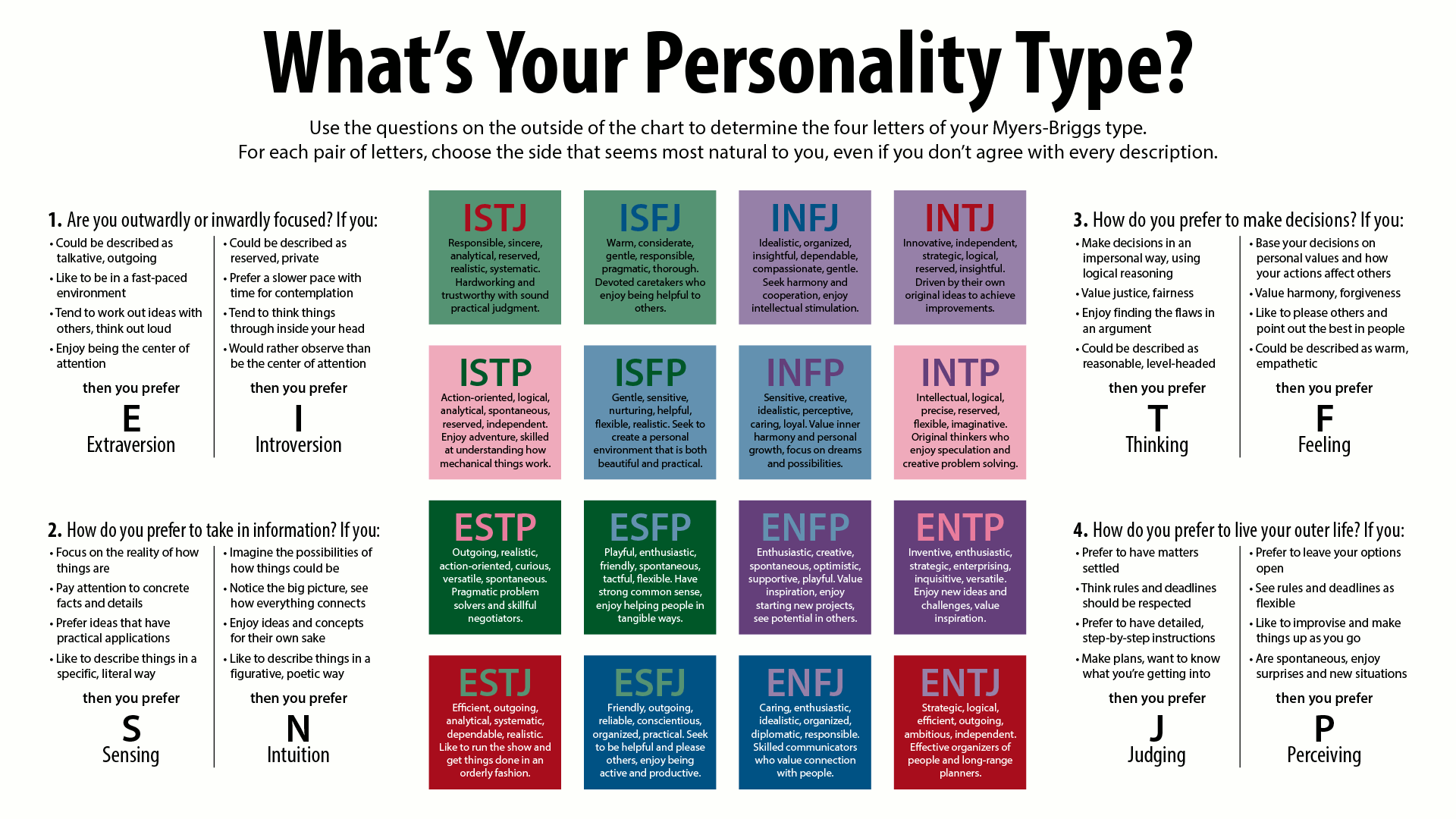Even though we know that most things exist on some sort of spectrum, science has a habit of wanting to place those things into neat little categories. Psychology is no exception. And when it comes to personality types, one of the more prominent systems is based on the Myers-Briggs Type Indicator. It’s a personality “test” (psychologists like to call it an “inventory”) with four dichotomous pairs. This results in a total of 16 possible personality types based on your preferences in each one of those pairs.
Having taken a few of the (highly unscientific and very unofficial) online tests, I have come to the conclusion that I am either an INTP or an INTJ. Let’s go through each of the dichotomous pairs.
Introversion (vs. Extraversion)
The first part of the INTP is the letter I, which stands for introversion. While I can be quite open and quite talkative among familiar company, I tend to be more reserved when it comes to larger or unfamiliar social situations. However, that’s only one part of what it means to be introverted.
Typically, introverts have more of an internal focus. What this means is that while they may enjoy the occasional social gathering, they tend to prefer quieter environments with a slower pace. That’s because these kinds of environments are more conducive to inner contemplation. Something that I learned in university was how to better organize my thoughts and this is precisely how introverts prefer to work out problems. By contrast, extroverts prefer to work them out in more of a team environment, thinking out loud.
Intuition (vs. Sensing)
The N in INTP stands for intuition. This relates to how I choose to gather and process information. Someone who prefers intuition is more likely to look at the big picture and consider the alternate possibilities. Looking at some of the other careers I considered, they all relate back to this sense of working with ideas and concepts, extrapolating what they could be or could become. This is also in line with some of the more philosophical musings that I post here on Beyond the Rhetoric.
By contrast, someone with a preference for Sensing (S) is more inclined to focus on how things are right now, looking at concrete details rather than contemplating abstract ideas. While I certainly pay attention to practical applications, I fully understand and appreciate the value of enlightenment and creativity for their own sake.
Thinking (vs. Feeling)
A person with a “Thinking” (T) preference is someone who prefers to make his or her decisions through rational and logical means. This is very much a “what’s good for the goose is good for the gander” kind of mentality. Someone who has more of a “Feeling” (F) preference, on the other hand, is more likely to be guided by emotions and value judgments. For them, it’s more about the spirit of the law, rather than the letter of the law.
If we were to consider the context of shopping, I’m more the kind of personality who would compare the spec sheets and gauge those against the asking price, rather than being led by how I “feel” about a product.
Perceiving or Judging?
With the first three components of my INTP (or INTJ) personality, I felt reasonably strongly that I leaned one way or the other. With this final component, I’m not as convinced. A person who is more inclined to Perceiving (P) is someone who likes to live more spontaneously, leaving his or her options open. They like to play it by ear. A person with a Judging (J) preference would rather have more structure and a well-laid out plan.
Thinking back to our Europe trip a few years ago, I can see how I fall somewhere in the middle of this P-J spectrum. On the one hand, I wanted to leave myself open to explore the different cities, following my moment-to-moment whims to pursue sporadic interests. On the other hand, I wanted to ensure that our schedule was solid and there would be no complications in terms of transportation or accommodation.
Quite the Personality
Taken as a whole, people with INTP personalities are logical, reserved and creative. They like to work out their own ideas in their head, taking the time to critically analyze the possibilities. Since they enjoy abstract thinking, routine tasks and hard structure are not their friends. Those with an INTJ personality will share many traits with their INTP counterparts, though they may be better at recognizing patterns, even when confronted with complex theoretical material. You can see how a scientist or engineer might fall into either one of these categories.
My current career as a freelance writer seems to be a good fit for my personality type, whether I’m more of an INTP or an INTJ. I prefer to work alone, I enjoy toying with concepts, and I like to draw logical conclusions. Freelancing provides for a certain level of flexibility (Perceiving), but it requires a disciplined sense of predictability too (Judging).
There is a great chart on Wikipedia (by Jake Beech, shown above) that outlines some key characteristics of each of the 16 Myers-Briggs personality types. INTP folks are described as “original thinkers who enjoy speculation and creative problem solving,” while INTJ personalities are “driven by their own original ideas to achieve improvements.”
I’ll take either one of those. Which personality type do you most identify with?







Trackbacks/Pingbacks